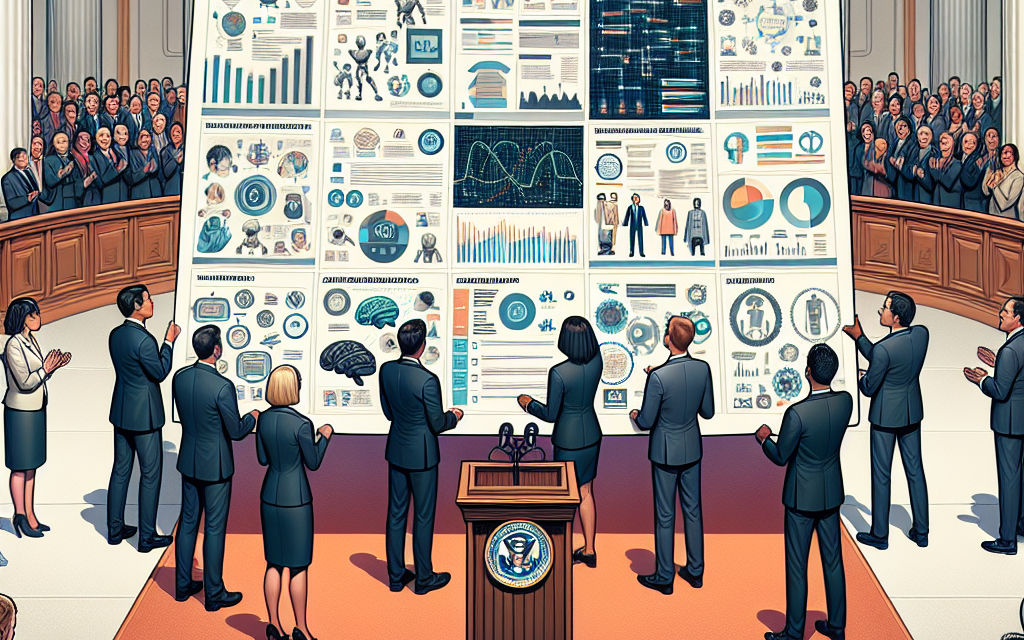Congress Unveils Comprehensive AI Policy Framework
As artificial intelligence (AI) continues to evolve and permeate various sectors of society, the need for a robust policy framework has become increasingly urgent. In response to this growing necessity, Congress has unveiled a comprehensive AI policy framework aimed at addressing the multifaceted challenges and opportunities presented by AI technologies. This article delves into the key components of this framework, its implications for various stakeholders, and the broader context of AI governance.
1. Understanding the AI Policy Framework
The newly introduced AI policy framework by Congress is a strategic initiative designed to guide the development, deployment, and regulation of AI technologies across the United States. This framework is not merely a set of guidelines; it represents a holistic approach to managing the complexities associated with AI, including ethical considerations, economic impacts, and national security concerns.
At its core, the framework aims to balance innovation with accountability. It recognizes the transformative potential of AI while also acknowledging the risks it poses, such as job displacement, privacy violations, and algorithmic bias. The framework is structured around several key pillars:
- Ethical AI Development: Promoting fairness, transparency, and accountability in AI systems.
- Economic Impact Assessment: Evaluating the effects of AI on the labor market and economic growth.
- National Security Considerations: Addressing the implications of AI in defense and cybersecurity.
- Public Engagement and Education: Ensuring that citizens are informed and engaged in discussions about AI.
- International Collaboration: Fostering partnerships with other nations to establish global AI standards.
This framework is a response to the rapid advancements in AI technology and the need for a coordinated approach to governance. By establishing clear guidelines and principles, Congress aims to create an environment that encourages innovation while safeguarding public interests.
2. Ethical AI Development
One of the most critical aspects of the AI policy framework is its emphasis on ethical AI development. As AI systems become more integrated into everyday life, the ethical implications of their use have come under scrutiny. The framework outlines several key principles to guide ethical AI development:
- Fairness: AI systems should be designed to avoid bias and discrimination, ensuring equitable treatment for all individuals.
- Transparency: Developers must provide clear explanations of how AI systems make decisions, allowing users to understand the underlying processes.
- Accountability: Organizations deploying AI technologies should be held accountable for their impacts, with mechanisms in place for redress in cases of harm.
To illustrate the importance of these principles, consider the case of facial recognition technology. Numerous studies have shown that many facial recognition systems exhibit racial and gender biases, leading to disproportionate misidentification rates among minority groups. The ethical implications of deploying such technology in law enforcement and surveillance contexts are profound, raising questions about civil liberties and social justice.
To address these concerns, the framework encourages the adoption of best practices in AI development, including:
- Conducting bias audits and impact assessments before deploying AI systems.
- Involving diverse stakeholders in the design and testing phases of AI technologies.
- Implementing robust data governance practices to ensure the quality and representativeness of training data.
By prioritizing ethical considerations, the framework aims to foster public trust in AI technologies and mitigate potential harms associated with their use. This is particularly important as AI systems increasingly influence critical areas such as healthcare, criminal justice, and employment.
3. Economic Impact Assessment
The economic implications of AI are vast and complex, prompting Congress to include a dedicated focus on economic impact assessment within the AI policy framework. As AI technologies continue to advance, they have the potential to disrupt traditional labor markets, create new job opportunities, and drive economic growth. However, these changes also pose significant challenges that must be addressed.
One of the primary concerns is job displacement. According to a report by McKinsey Global Institute, up to 375 million workers globally may need to switch occupational categories due to automation and AI by 2030. This transition could disproportionately affect low-skilled workers and those in industries most susceptible to automation, such as manufacturing and retail.
To mitigate these risks, the framework emphasizes the importance of proactive workforce development strategies, including:
- Reskilling and Upskilling: Investing in training programs to equip workers with the skills needed for emerging job opportunities in the AI economy.
- Support for Displaced Workers: Providing financial assistance and job placement services for individuals affected by automation.
- Encouraging Entrepreneurship: Fostering an environment that supports innovation and the creation of new businesses in the AI sector.
Moreover, the framework calls for ongoing research to assess the economic impacts of AI on various sectors. This includes analyzing productivity gains, shifts in labor demand, and the overall contribution of AI to economic growth. By understanding these dynamics, policymakers can make informed decisions that promote inclusive economic development.
Case studies from countries that have successfully navigated the challenges of AI adoption can provide valuable insights. For instance, Singapore has implemented a national strategy focused on reskilling its workforce and promoting AI innovation, resulting in significant economic growth and job creation in the tech sector. Such examples can serve as models for the United States as it seeks to harness the benefits of AI while addressing its potential downsides.
4. National Security Considerations
The integration of AI into national security strategies is another critical component of the comprehensive AI policy framework. As AI technologies become increasingly sophisticated, they present both opportunities and challenges for national defense and cybersecurity. The framework outlines several key areas of focus:
- AI in Defense: Exploring the use of AI for military applications, including autonomous systems, intelligence analysis, and logistics optimization.
- Cybersecurity: Enhancing cybersecurity measures through AI-driven threat detection and response systems.
- Ethical Use of AI in Warfare: Establishing guidelines for the ethical deployment of AI technologies in military operations.
The potential for AI to revolutionize military operations is significant. For example, AI-powered drones can conduct surveillance missions with greater efficiency and accuracy than human operators. However, the use of autonomous weapons raises ethical questions about accountability and decision-making in combat situations. The framework advocates for a cautious approach, emphasizing the need for human oversight in critical military decisions.
In terms of cybersecurity, AI can play a pivotal role in identifying and mitigating threats. According to a report by Cybersecurity Ventures, cybercrime is projected to cost the world $10.5 trillion annually by 2025. AI-driven systems can analyze vast amounts of data to detect anomalies and respond to threats in real-time, enhancing the overall security posture of organizations and government agencies.
To address these national security considerations, the framework encourages collaboration between government agencies, private sector companies, and academic institutions. By fostering partnerships, stakeholders can share knowledge, resources, and best practices to enhance the security and resilience of AI systems.
5. Public Engagement and Education
As AI technologies continue to shape society, public engagement and education are essential components of the AI policy framework. Ensuring that citizens are informed about AI developments and their implications is crucial for fostering trust and promoting responsible use of these technologies.
The framework outlines several strategies for enhancing public engagement:
- Public Awareness Campaigns: Launching initiatives to educate the public about AI technologies, their benefits, and potential risks.
- Community Involvement: Encouraging public participation in discussions about AI policy and governance through town hall meetings and online forums.
- Educational Programs: Integrating AI education into school curricula to prepare future generations for a technology-driven world.
For instance, organizations like AI4ALL are working to increase diversity and inclusion in the AI field by providing educational resources and mentorship programs for underrepresented groups. Such initiatives are vital for ensuring that a broad range of perspectives is considered in the development and deployment of AI technologies.
Moreover, the framework emphasizes the importance of transparency in AI governance. By providing clear information about how AI systems operate and the decisions made by policymakers, stakeholders can build trust and foster a collaborative environment for AI development.
Conclusion
The unveiling of Congress’s comprehensive AI policy framework marks a significant step toward addressing the complex challenges and opportunities presented by artificial intelligence. By focusing on ethical development, economic impact assessment, national security considerations, and public engagement, the framework aims to create a balanced approach that promotes innovation while safeguarding public interests.
As AI technologies continue to evolve, ongoing dialogue among stakeholders will be essential to ensure that the framework remains relevant and effective. By fostering collaboration between government, industry, academia, and the public, the United States can harness the transformative potential of AI while addressing its associated risks.
In summary, the comprehensive AI policy framework represents a proactive approach to managing the complexities of AI governance. By prioritizing ethical considerations, assessing economic impacts, addressing national security concerns, and engaging the public, Congress is laying the groundwork for a future where AI technologies can thrive in a responsible and inclusive manner.





